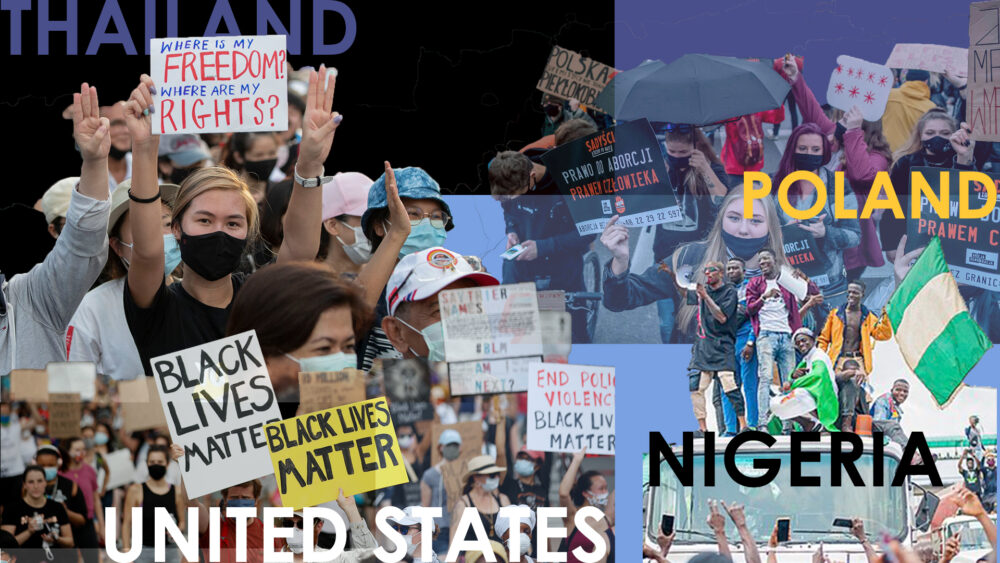
By Katy Nguyen
Even during the COVID-19 pandemic, people across the globe have continued to take to the streets to protest injustices. Here are the ongoing protests of 2020.
North America
The George Floyd protests have been ongoing across the United States and in over 60 countries around the world as part of the Black Lives Matter movement that fights police brutality in the United States. Local protests first erupted in Minneapolis, Minn. over the death of George Floyd by police officer Derek Chauvin, who knelt on Floyd’s neck for nearly eight minutes, while three other officers prevented passers-by from intervening.
Asia
The Hong Kong protests of 2019 have called for several demands, among them larger autonomy and an investigation into police brutality, that have still been unmet by the Chinese government.
Demonstrations were initially triggered by the introduction of the Fugitive Offenders amendment bill, which would place Hong Kong, a region that has enjoyed separate and autonomous governance, under the Chinese government’s control.
The initial extradition bill protests have led to a series of larger pro-democracy protests, however, efforts have been suppressed. The Chinese government’s attempt to shut down these protests have led to the mass resignation of pro-democracy lawmakers in the National People’s Congress (China’s legislative body), whose efforts were also condemned.
In Thailand, protests began in February, against the government of Prime Minister Prayut Chan-o-cha. Chan-o-cha came into power in a 2014 coup and was elected in 2019. Triggered by the dissolution of the Future Forward Party, which was founded on a progressive platform, protesters have called for the Thai monarchy reform.
Protestors have demanded constitutional change due to the monarchy’s strict lese-majeste law, which gives a sentence of up to 15 years for those who speak up against them. The Thai police have used water cannons to disperse crowds of student-led demonstrators, while the government continues their crackdown on the protests.
Africa
The #EndSARS movement in Nigeria was revitalized on Oct. 8, 2020 over continuous police brutality in the country. It started as a Twitter hashtag in 2017, when organizers called for the disbanding of the Special Anti-Robbery Squad (SARS) that has a long record of abuse. The government of Nigeria has imposed a crackdown on peaceful demonstrations while continuing to vow to work with human rights groups on reforming law enforcement. With nothing having been done, the Human Rights Watch has accused the government of oppressing the protestors.
Europe
In France, following a knife-attack at a church which killed three people, caricatures depicting a mockery of the Muslim Prophet Muhammad were published in a newspaper. Muslims around the world have called for the boycott of French products after President Emmanuel Macron’s interview with Al-Jazeera that only fueled more anger. In the interview, Macron said that under the right to freedom of expression, all religions are allowed to be practiced as well as subject to having caricatures.
Anti-government protests over the authoritarian regime in Belarus have erupted since May 24, 2020. The organizers have called for President Alexander Lukashenko to step down from his position. President Lukashenko refused to meet their demands, instead, putting up roadblocks and water cannons and arresting droves of protesters.
Since the Prosecutor’s raid on the Presidency of Bulgaria, led by Prime Minister Boyko Borisov, protests erupted in the city of Sofia with support from Bulgarians around the world. These protests have long been fueled by corruption in Borisov’s administration since his election in 2009. Protestors have unsuccessfully demanded the resignation of Borisov.
In Poland, protests and anti-government demonstrations have been ongoing since Oct. 22, 2020, due to ruling by the Constitutional Tribunal. This ruling tightened abortion laws and made almost all avenues to abortion illegal with exceptions granted only when the health of the woman is affected or the pregnancy was caused by rape or incest. The movement has grown to a larger Women’s Strike that the Polish government intends to crackdown on.





